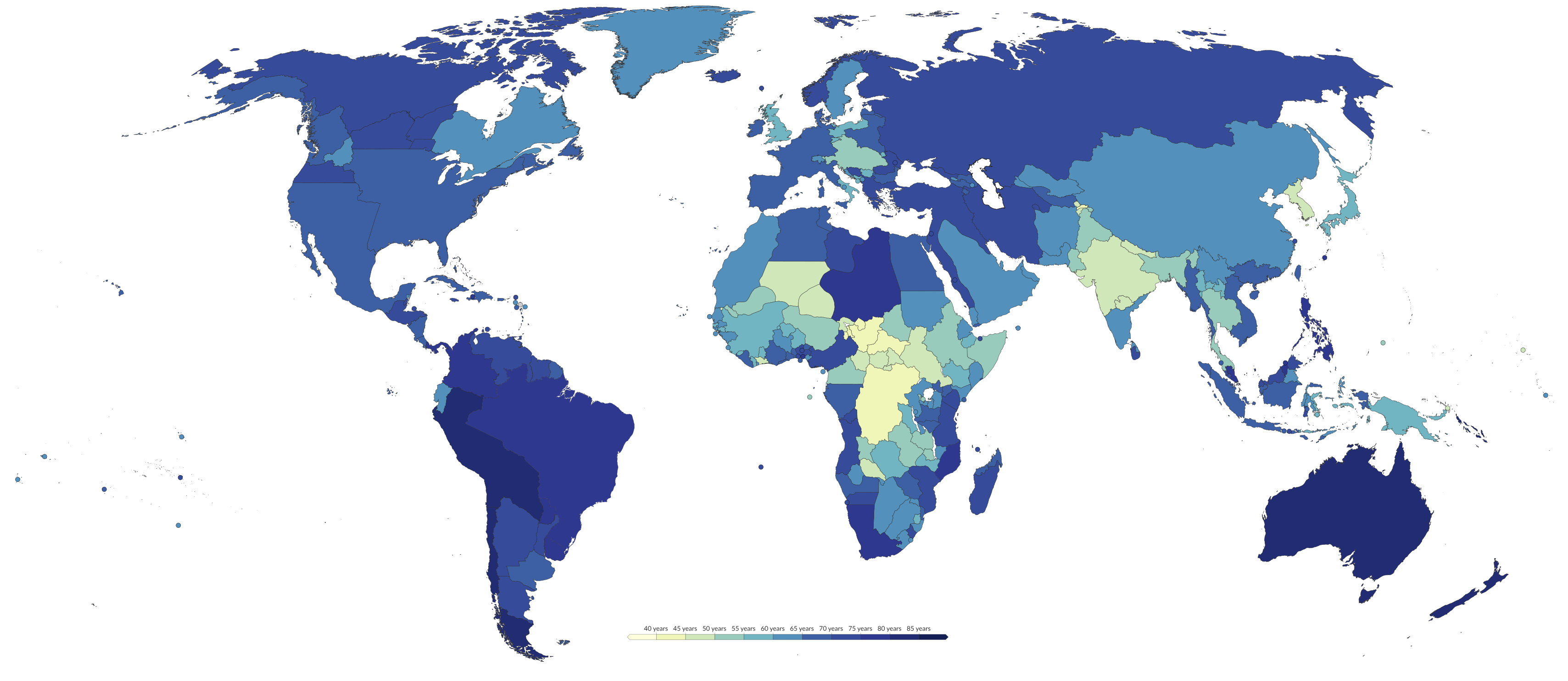During the Postwar Crisis (1955-1959), there was a widespread consensus that some sort of International governing body would be needed to tame the undue spread of diseases brought about by war. Various national and international health organizations merged in 1957 under the Treaty for the Creation and Maintenance of a Global Immune System, one of many treaties forging the Organization for Global Security (OGS). During Winter (IV), the organization was expanded to include most countries across the globe. In 1970, Russia, the British Commonwealth, China, and Turkey were added as members, forming the Global Defense Council (GDC). Alongside the seven permanent members, an additional five members are cycled yearly from amongst the other World nations. GDC Edicts form the backbone for modern international law, superseding national law, although they do not supersede Regional Law. The GDC serves as an institution for international crisis management, leading the Aerosol Campaign, the Intervention in Ecuador, and Operation Phalange, among many others. The GDC is also known as The Shield, due to its image as an international defender of common humanity. Russia's seat has since been moved to Merv as part of the integration of the Eurasian Joint Cooperation Council, while the Commonwealth seat has been moved around various times before being finalized at Labuan.
You are using an out of date browser. It may not display this or other websites correctly.
You should upgrade or use an alternative browser.
You should upgrade or use an alternative browser.
Changing of the Seasons: an Independent Oregon TL
- Thread starter tae_will21
- Start date
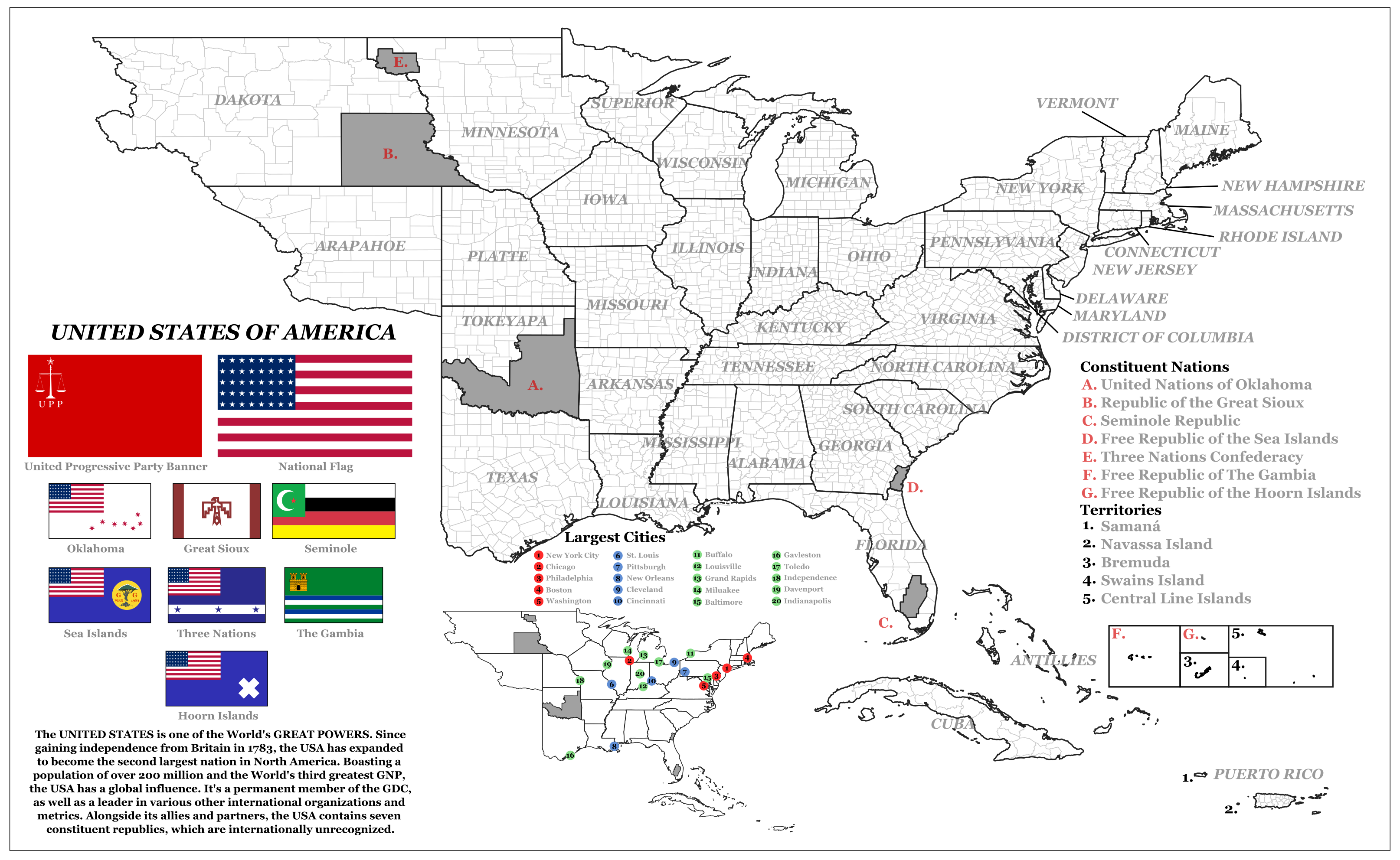
A basic map of the United States and its Constituent Nations as of 2024, denoting internal county borders within the states (this is from back when I thought it would be a good idea to map out 1000 alternate counties in QGIS)
Last edited:

This map depicts famine levels at their peak in 2019, they would decline over the next three years
The effects of the Great War did not end with deaths on the battlefield, nor with the devastation of the plagues of the 50s and 60s. Widespread use of soil poisoning and long-term biological agents like anthrax substantially decreased yields in affected areas for decades after the war. Regions most affected were in Eastern and Central Europe and on the Indian Subcontinent, a result of the devastating Indian War (1957-1963). While the use of Gemulaic[1] Modified Foods have massively increased crop yields across the developed world, many areas do not have access to such technologies and have struggled to feed their rapidly growing populations. As the world population is set to pass an unprecedented six billion as soon as 2030, many countries have failed to keep up food production. These effects are compounded by the threat of Anthropogenic Warming[2], caused by the release of Carbon Dioxide and other gasses into the atmosphere. Beginning in 2018, crop failures across Eurasia cascaded into a food crisis and eventually a famine, prompting intervention from the GDC. In 2019, the ongoing famines were declared a Global Crisis, and a coalition was formed to provide relief and combat piracy in the South China Sea and Indian Ocean that was hampering aid efforts. By 2022, the crisis was over, but not without many casualties, with estimates reaching up to 60 million dead worldwide, which would make it the worst event in terms of mortality rates since the '61 Plague.
[1]: Genetics
[2]: Global Warming
Last edited:
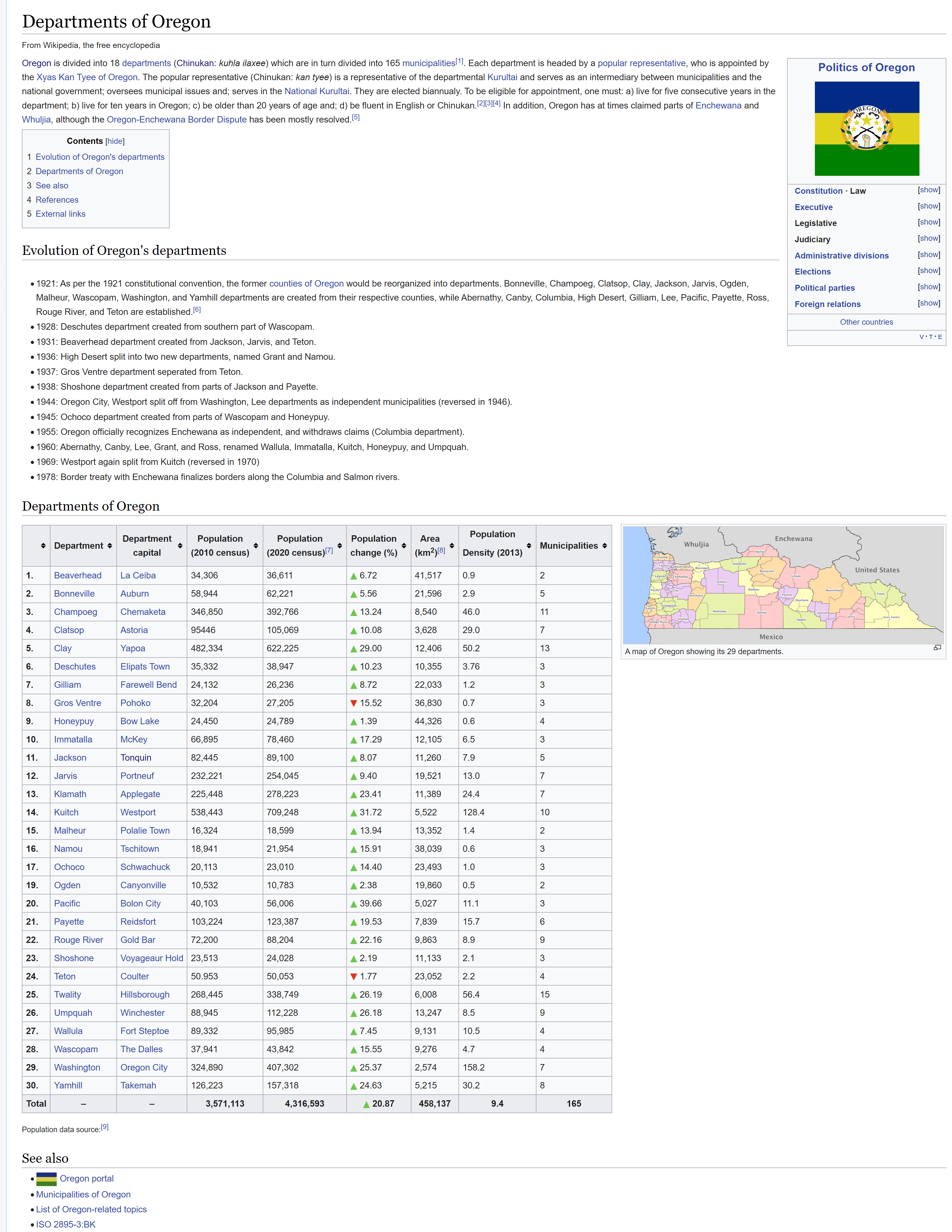
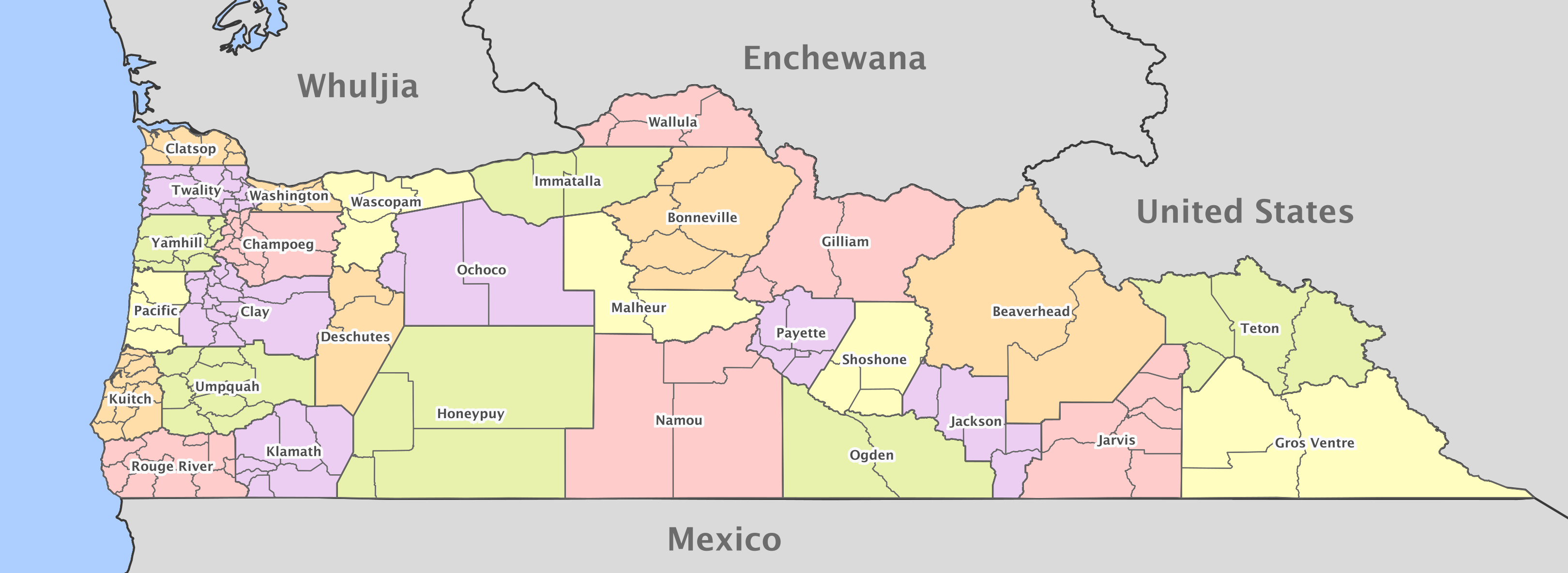
First look at the star of our story, the Republic of Oregon. Founded in 1864 from the remains of Oregon Territory, the Republic of Oregon (Chinukan: Konomoxt Oregon) is a large Kutultai Republic in North America. In the present day, Oregon has a population of close to 4.5 million and growing. The principal ethnic groups of Oregon are Oregonians, descendants of early settlers who speak Chinukan, Anglo-Californians, who speak Californian English and live mostly in the Klamath and Umpquah departments, and Americans, who speak English and live mostly in the sparsely-population Eastern Oregon. In recent years, there have also been many Asian immigrants to Oregon, with Asians now making up a plurality of the population in Kuitch department. Three-fourths of the population is located West of the Cascade range, concentrated around Westport and the Willamette Valley.
Last edited:



This is a new Article from the Westport SĪNANĪTCHISH, one the main newspapers in Oregon and one of the largest representing the Liberal Ameliorians. (SĪNANĪTCHISH means (those who)watch the sea in Chinukan, and represented a word for cosmopolitan Westport residents who during the Gatch dictatorship in the early 20th century would ''look out to sea'' for foreign intervention in their county; when this did come and the Liberals overthrew the regime in the 50s, the Westport Daily renamed itself) - also your first look at Chinukan, and the orthography I used for it
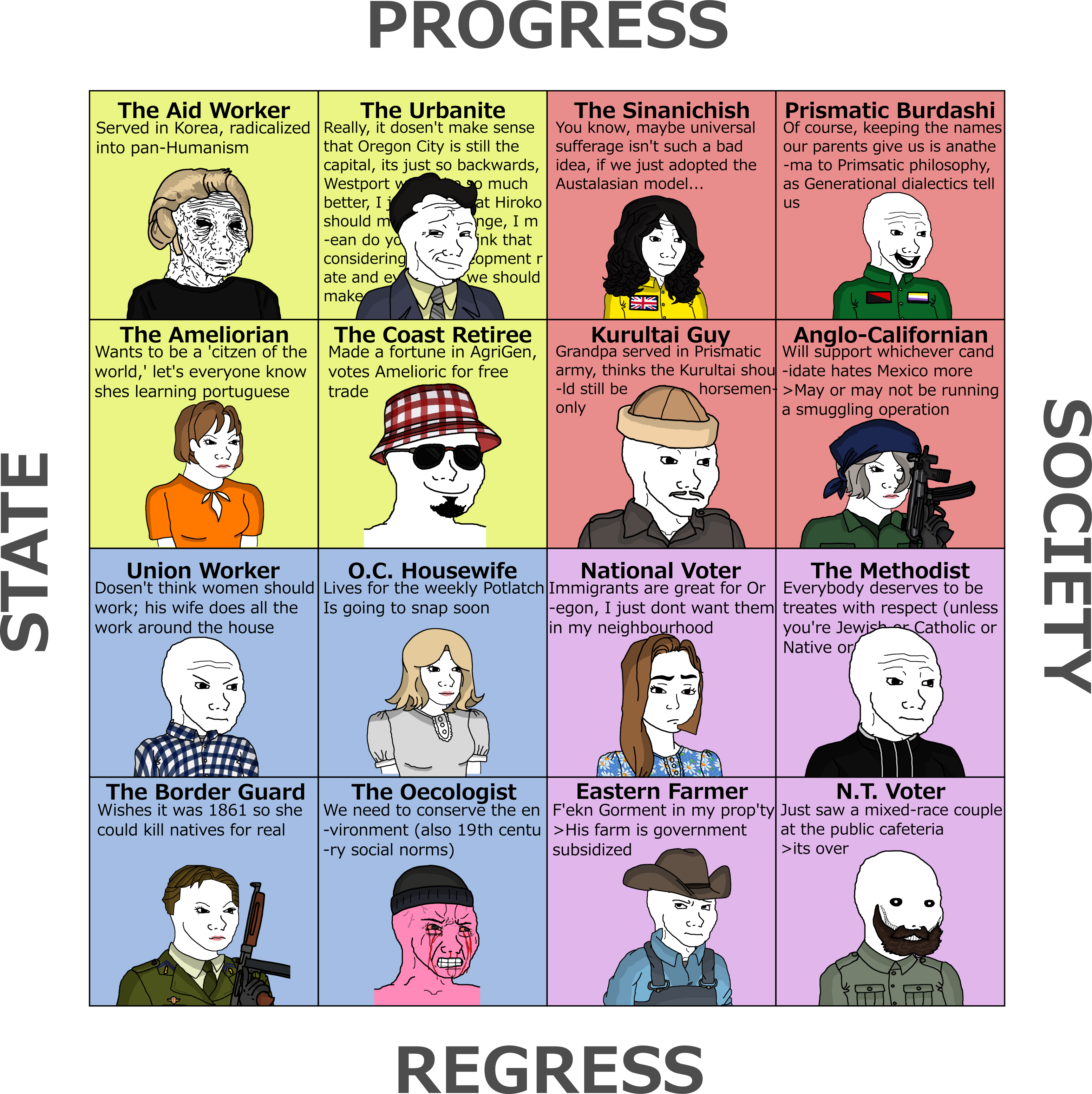
Kind of stupid, but I made a wojak compass thing to give a better look at the dynamics of the Oregonian political system. The Axes are for those favoring societal dynamism compared to tradition, and those favoring state institutions compared to societal ones.
Nawitca Tilikum Voter: He grew up in rural Clatsop, and listened intently to his grandfather's stories of the ‘59 war with Whuljia. Masked his insecurities and desire for acceptance by being insanely racist with his fellow nationalists. Actually believes in the concept of ‘conquest marriages’ (as bad as it sounds). He totally admires the army, but won’t actually join, instead working at a local factory. He brags to his friends at the cafeteria about the one time he faced off against a ‘savage native’ (they were on opposite sides of the Columbia river).
Eastern Farmer: He was born in Ochoco department, and has only left once in his life, to go to a fair in the Dalles. His whole family would vote Nationalist if they could. Opposes the single tax, and wishes that the ‘Big-city Westport fat cats’ could get their hands out of his business. He receives large subsidies paid for by Westport manufacturing output. Is vaguely put out about the idea that his crops are being sent to famine relief in Korea, although he won’t specify why. Speaks a mixed dialect of English and Chinukan that would give a Westerner an aneurysm.
Oecologist: Born outside of Chemaketa near the Cascades, his formative experience was from his time in the Oregon Wilderness Scouts, which drilled into him love for the environment (and hazing solidarity). He was enraptured by malthusian arguments pumped out by the French Oecology movement of the ‘00s. He was pushed away from the Ameliorians and Nationals because of their immigration policy, which he cloaks in arguments over sustainability. He secretly admires the total closed-border policy of Enchewana and wishes Oregon could do the same. Saw a same-sex couple on trail one time and to take deep breaths to calm down.
Border Guard: she was born in Portland, and educated by stories of the heroic Oregonians of Willamette valley history. Was disconsolable when she wasn’t able to join the Wilderness Scouts, spent her time reading Pioneer Tales and watching The Last Stand!. Joined the army out of school, whose culture perpetuated her personal siege mentality. Hates Whuljia, the US, and Mexico with a passion. She secretly wishes it was 1861 so she could go into battle with the original Oregon Rifles (women were not allowed in the Oregon Rifles).
Methodist: He was born to middle class hard-working immigrant parents from California, disappointed them by joining the ministry instead. Avoids cafeterias and potlatches, tends to private works of charity which make him feel better about himself. Guilt complex drives his sense of moralism. He is very kind and accepting to anyone (as long as they’re protestant, will become more racist than you can imagine regarding Catholics, Jews, and Enchewaneans). Wants to go on a mission to Whuljia to ‘civilize the noble savage’ (Whuljians are 90% Christian).
National Party Voter: She grew up in Fort Boise and loves Oregon. She thinks that everyone should have the right to become an Oregonian, even immigrants (not natives, obviously). When her daughter made friends with the children of a Japanese family, she told her not to eat their ‘ethnic’ food. Lobbies with other ‘Wives of Boise’ at local potlatches to not have ‘undesirable elements’ move into their city. Racially prejudiced against Asians, Americans, Mexicans, and ‘mixed-blood’ people from Teton.
Oregon City Housewife: Born in Yapoa, she never went to highschool, instead working from a young age at cafeterias and newspapers. Her marriage has yet to morph into the Caiapora romance novels she read as a kid, but more of an Encantado. She lives for her weekend potlatches with friends, and spends the rest of time doing housework and self-medicating for stress. She lives vicariously for her daughter, who may or may not resent her for it in the future.
Union Worker: Grew up in the staunchly union-working dockside neighborhood in Port Orford to a poor family. Taught from a young age by his parents to be responsible and work for himself, internalized it with intense misogyny. Went to trade school, works now in a factory on the Alsea, spends his union-won extra hours in the cafeteria trying to convince his union leader to vote Worker’s at the next Kurultai (he will vote Ameliorian) because he longs for a world where ‘no women has to work, and they can stay at home where they belong.’ (his wife does all the housework, which he doesn't consider work because it's unpaid).
Anglo-Californian: her ancestors lived in California since the 1860s, and were forced to flee after the first rebellion in ‘54. Can’t speak Chinukan, and can barely understand American Standard English. Lives in Rouge River in a mostly-Californian town at a lumber mill that may or may not be a secret weapons smuggling scheme. Will urge her local delegate to vote for whoever has the harshest stance against Mexico. She’s still mad about how America abandoned the Californian rebels during the Great War.
Kurultai Guy: Grew up in Cincinnati, Yamhill. His grandfather fought in the prismatic army. He loves horses, and has been to every Lee City Kokpar game for the last 8 years. He thinks that the country would be better off if everyone lived a nomadic life like a ‘true prismatic warrior.’ During his childhood, he longed to be a runner at the WorldGames like his idol, Joaquim Cruz. Since his failure to find success in running, he puts an unhealthy amount of pressure on his son to be good at sports, which will lead to the latter resenting all physical exercises.
Coast Retiree: Born in Umpquah City, he made a fortune in Eastern agriculture. Now spends his time lobbying the government to increase R&D funding into Gemulaic development. Bought oceanside property in the Yamhill coast where he holds get-togethers with his estranged family, and spends his summers fishing in Patagonia with his Brazilian work buddies. Opposes immigration and social change, but will vote Ameliorian anyway for free trade and immigration. He thinks Brazilian NGOs should ‘open up’ Whuljia and Enchewna to ‘development.’
Ameliorian: Despite being born and raised in Portneuf, she is a very progressive person. Her parents taught her to think for herself (while providing an Ameliorian perspective), and she’s always been the one to play devil's advocate in conversation. She thinks Kokpur is violent and brutish, and watches the slightly-less violent Calcio instead. Has a bookshelf full of foreign books, and delights in letting her friends know she’s learning portuguese. Wants Oregon to lower all trade and immigration barriers so there'll be more exotic ingredients in stores.
Prismatic Burdashi: They grew up in a small town in Champoeg. Watched Khorasan twenty times as a kid and cried every time when Pyotr died. Their life was changed by reading Sexual Eonism and Generational Dialectics, was converted to Prismaticism and tried learning Russian. Moved away from small-town isolation at 18 to Yapoa, where they now spend their time working at a bakery and arguing with other Prismaticists about means of generational difference and societal advancement.
Sinantichish: Born in Applegate, her parents put up everything to put her in College, where her top marks allowed a prized study abroad in Australasia. Her world was broadened to include Cariñosa music, oyster sauce, and representative democracy. When she can afford it, she talks to her Aussie friends through the telecommunications line in Westport, bemoaning the reactionary and unequal aspects of Oregonian society. She has a Union Jack on her bedroom wall. She works in a unionized garment factory and spends time in the cafeteria with her girlfriend (both are socially discouraged in Australasia).
Urbanite: He was born in Milkwich, but went to school and studied in Westport, has never left. He was forced to confront his own biases when he fell for a Malaysian foreign student, and has since made it his mission to tell everyone how progressive he is. Became a national delegate through years of hard work and service, and makes sure to take lots of pictures of the national kurultai to rub in his friends faces later at the Eleham Affinity Board luncheons (he’s too proud to go to a cafeteria). Is legitimately accepting if in a patronizing way.
Aid Worker: Her small-town Lutheran parents taught her the importance of service. When she left her insulated community, she was shocked to see conditions in public housing in the poorer neighborhoods of Oregon City. She joined the UMRC aid mission to Korea where she got a full taste of the depths of human misery. There, she was swayed by pan-humanism and became a fervent defender of the Global Defence Council. She wouldn’t vote if made a delegate, and once yelled at her son’s teacher for teaching him about space travel.
Last edited:
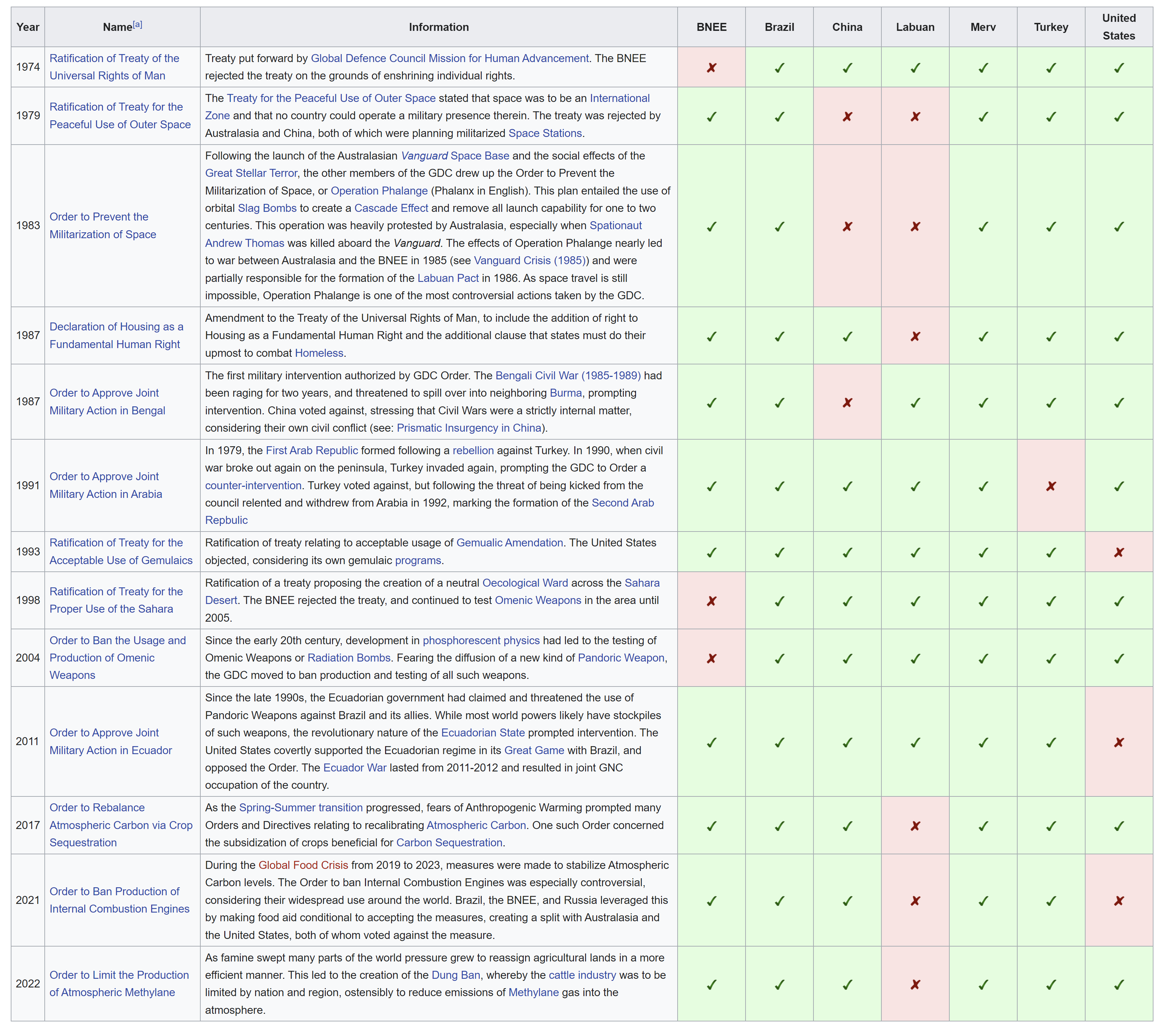
From a Wiki of controversial GDC Orders (5 out of 7 members necessary for ratification)

Last edited:
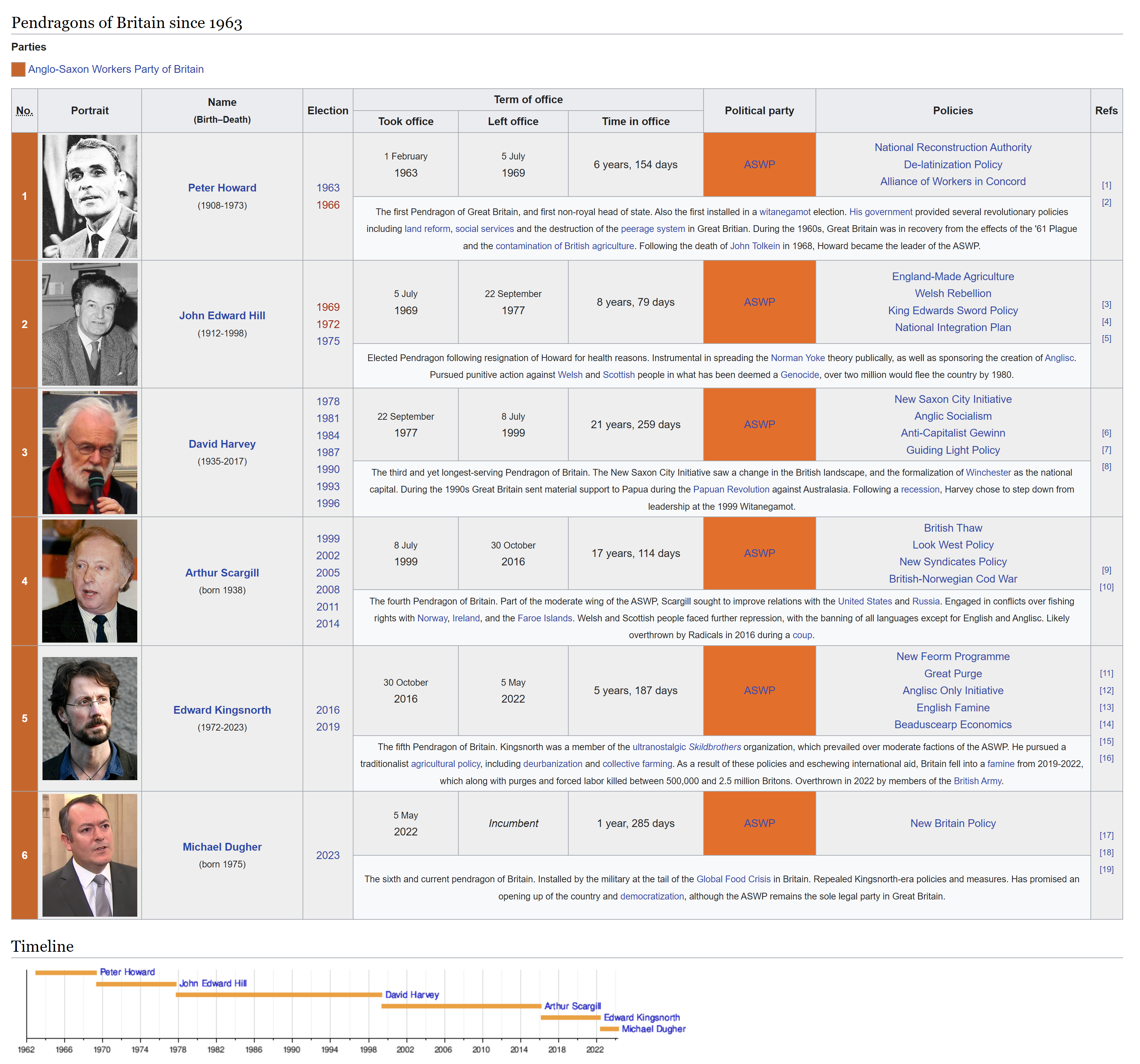
Following its crushing defeat during the Great War, the United Kingdom split apart. When the royal family fled the increasingly unstable country to Sydney in 1959, a hole was made, that was filled with an eccentric and strange political organization. The Anglo-Saxon Workers Party of Britain was founded in the 1940s as a 'national socialist' party, influenced by the 'agrarian idyll' and 'Anglo-Saxon purity' as espoused by John Tolkien and E.A. Freeman. Upon taking control of the country, the ASWP attempted to reorganize it in an Ultranostalgic manner, going as far as to attempt to create a 'pure' form of English without foreign language influence, called Anglisc (despite decades of trying, this has not caught on). While throughout the 80s to 2010s Britain moved forward with mostly pragmatic socialist policies (if isolationist and genocidal), the ascension of Edward (born Paul) Kingsnorth and his radical faction upended English politics. Kingsnorth presided over several disastrous reforms to the British agriculture and industrial system, resulting in a famine and political crisis. While Kingsnorth was overthrown in 2022, Great Britain is still struggling to recover from his policies.
Last edited:
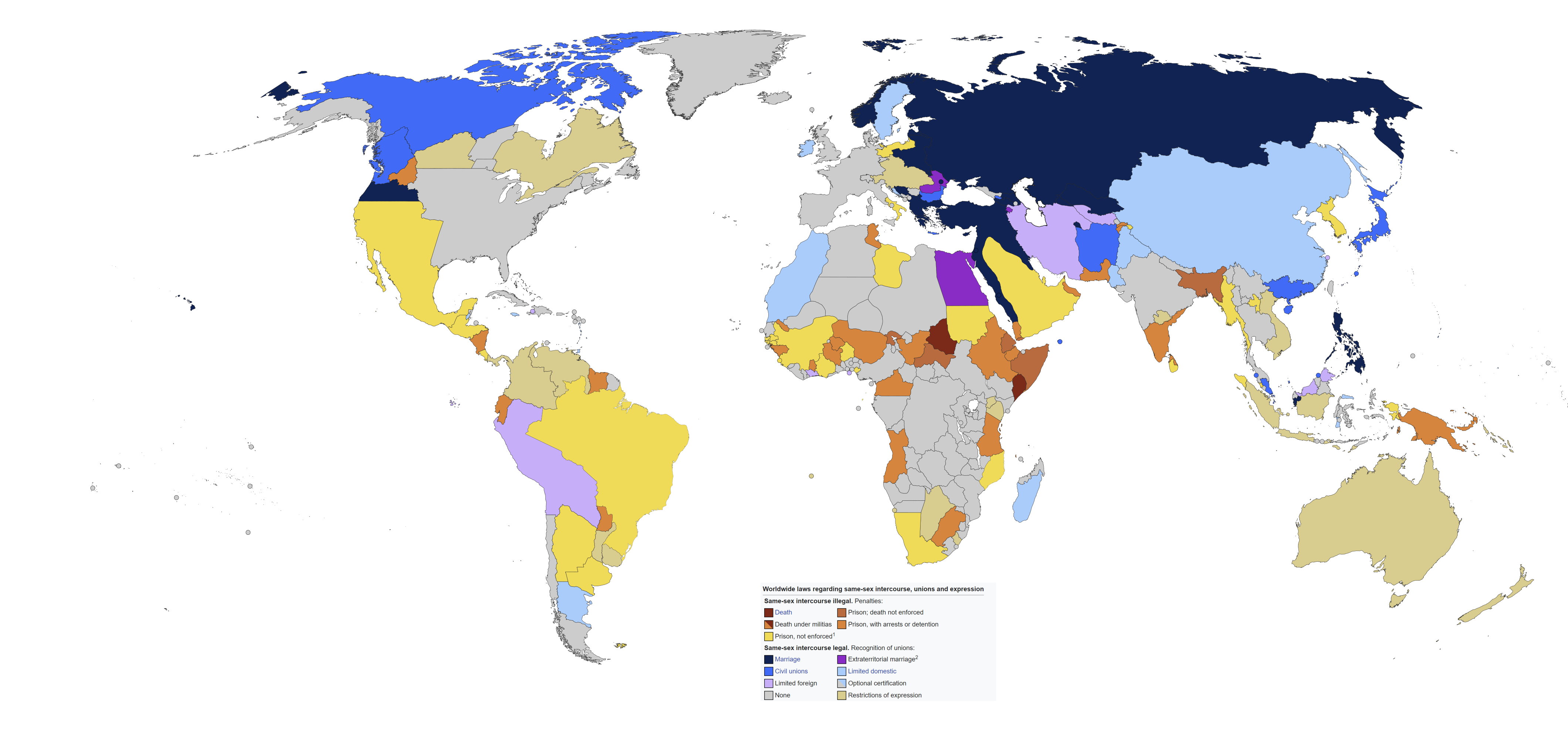
Rights for FUBE (Fricatrive, Uranian, Burdashi, and Epicene) people have over the course of the 20th century been a major point in discussions over human rights, with the rights of Uranian marriage and sexual relations being majorly split between Integralist and Prismatic-influenced areas.
Last edited:
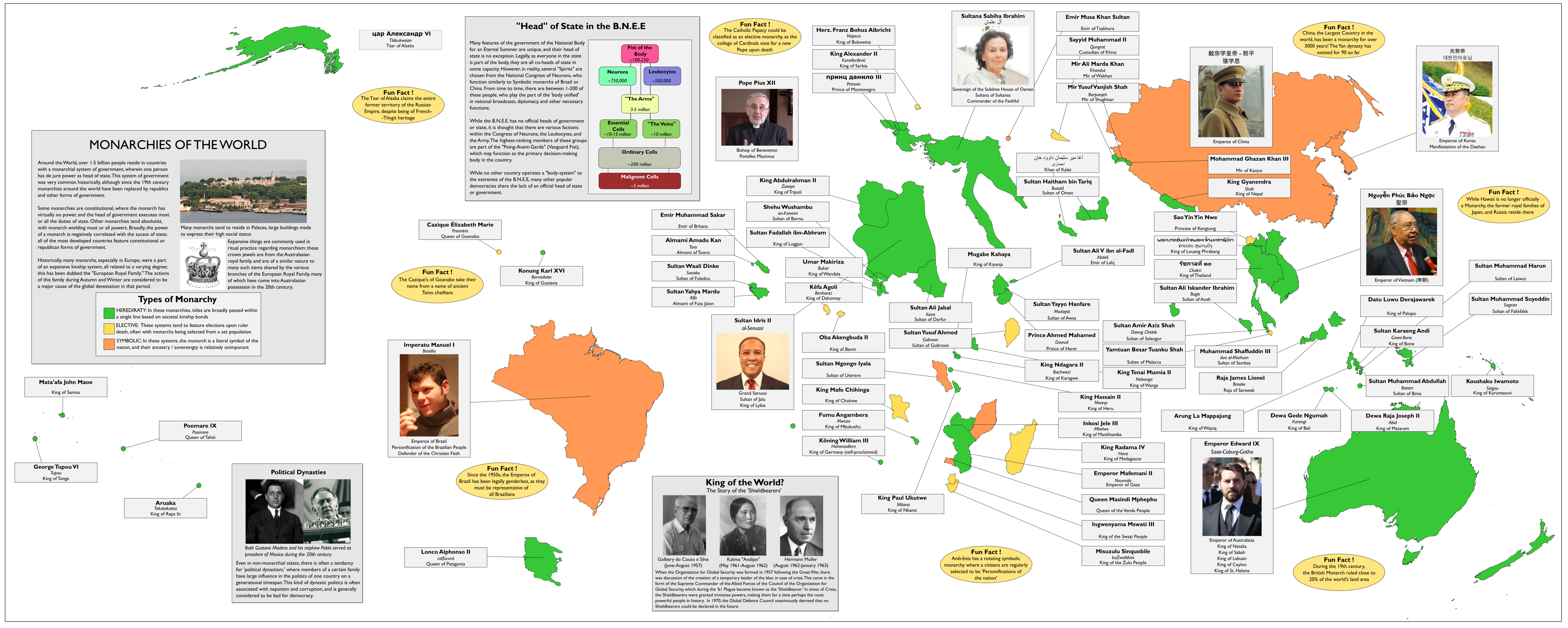
A little infographic on the various national-level monarchies of the world
Last edited:
Been a while with finals, here's a quick map of the States of Mexico in the meantime

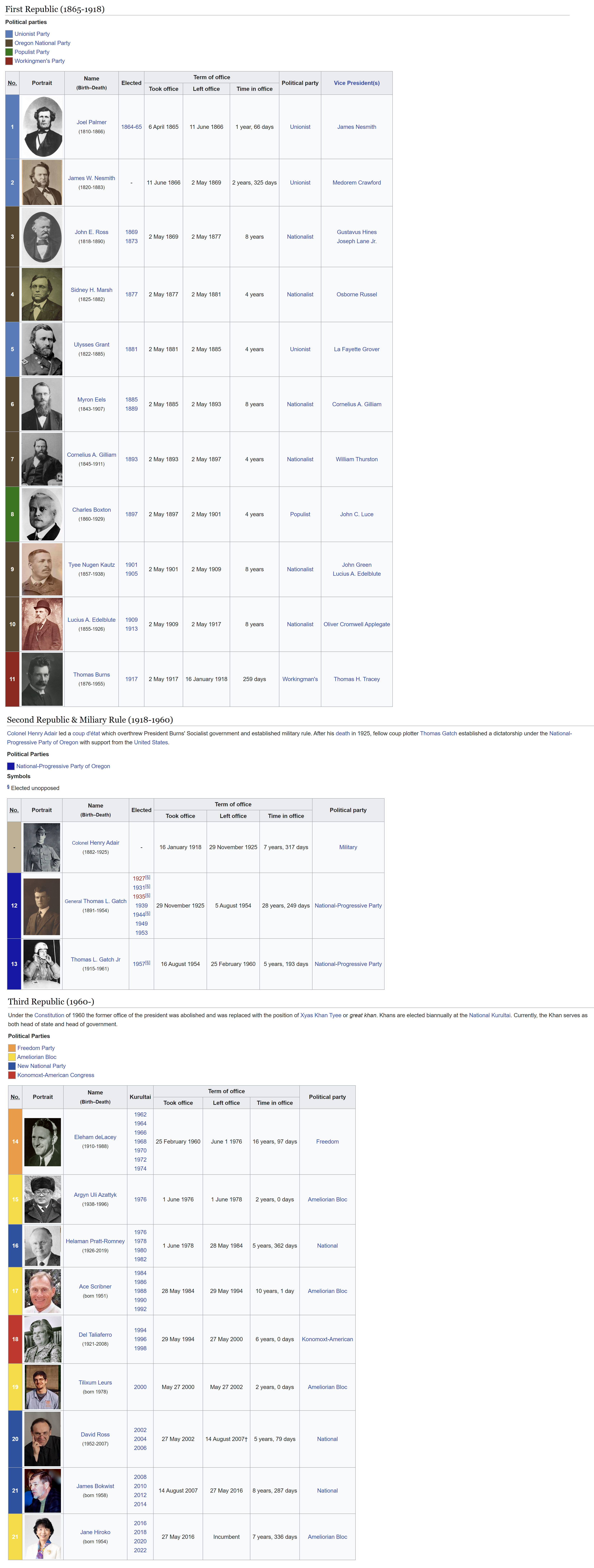
List of Heads of State of Oregon: doesn't include appointed territorial governors or provisional governors during the Provisional Government Period (1841-65)
Share:

